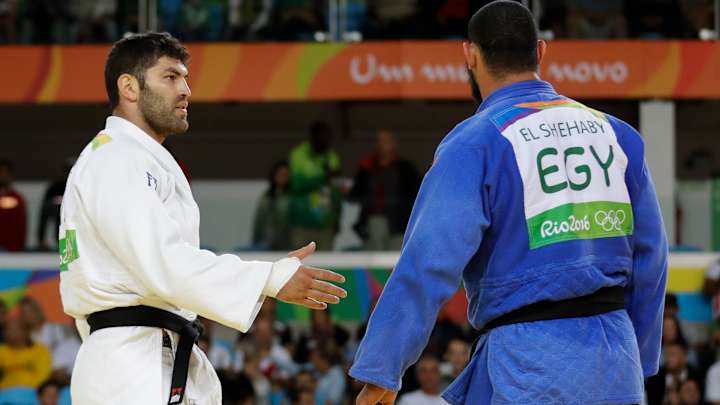Etiquette of judo integral to Japanese martial art

RIO DE JANEIRO (AP) Judo is a Japanese martial art that was developed in the 19th century based on principles of self-defense. Its creator, Jigoro Kano, combined elements of jiu jitsu, wrestling and karate with other styles of fighting.
The combat sport typically uses the opponent's force against him, forbids striking and is not intended to do serious damage to rivals; even the sport's most violent holds give competitors the chance to tap out.
According to the International Judo Federation, the sport's governing body, etiquette is essential for any judo player, or judoka. That etiquette appeared to be torn to shreds on Friday when Middle Eastern politics spilled onto the judo mat.
Islam El Shehaby of Egypt refused to shake hands with his winning opponent, Or Sasson of Israel. The Egyptian lay flat on his back for a moment before rising and standing opposite Sasson in front of the referee. When Sasson extended his hand, El Shehaby backed away, shaking his head.
The referee called El Shehaby back to the mat and obliged to him to bow; El Shehaby gave a quick nod, and he was loudly booed as he exited.
Here are four basic tenets and rituals of judo.
THE BOW
Judo practitioners bow to each other before and after a fight as a sign of courtesy. When judo players first start training, they are typically taught to bow upon leaving and entering the dojo and to any instructors. During a match, bowing to the opponent signifies the courtesy to each other as opponents and a recognition that the bout must be fought with fairness and good sportsmanship.
RESPECT
Judo players are supposed to respect all of their rivals and treat them with the utmost respect. Knowing that the techniques they have mastered may do serious harm to others, judo players are supposed to fight with honor and with an understanding that such maneuvers should only be used under controlled conditions. According to the IJF, ''judo students learn much of the social etiquette necessary to become solid citizens of the world.''
MODESTY
Judoka are taught to be modest; any boastful or bullying behavior is not tolerated. Judo players are expected to have respect for their opponents after a match has ended and are to avoid any arrogant display that may offend others. Judo fighters are to remain modest no matter who has won the match. Victors are expected to keep their celebrations humble and losers are expected to behave with dignity.
PERSEVERANCE
Judo players are instructed not to give up and to keep training continually to improve their mental and physical performance, especially after they have suffered a defeat. Even after a difficult loss, judo players are supposed to maintain their composure and uphold the martial art's tenet of perseverance. They should not be overwhelmed by a defeat and should always act courageously.
